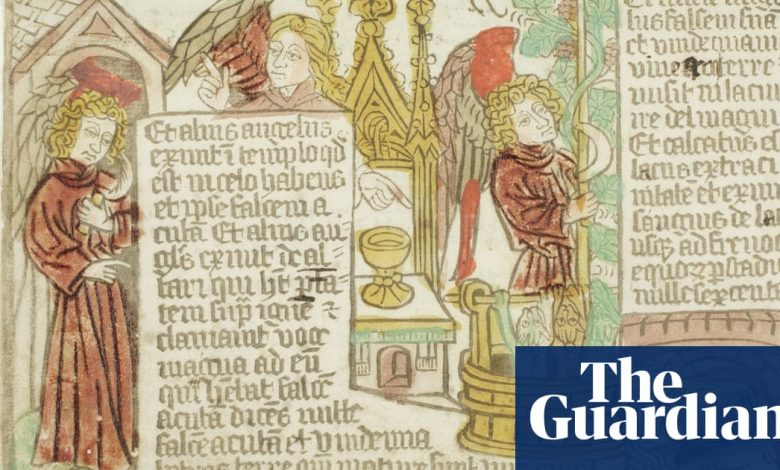God’s Ghostwriters by Candida Moss review – did enslaved scribes write the New Testament? | History books

[ad_1]
ZRahm Green, who writes so much about Catholicism in his novels, is regularly asked if he is still a believer. It was listening to the Gospel accounts of Jesus’ life, he replied, and hearing passing references thrown into the narrative that had no obvious purpose for being there—like the “other” unnamed disciple who sprinted past Peter on his way to the empty tomb—that tempted him to believe that the gospels might just be fact.
At least this fast but redundant student is there and it shows. in God’s ghostwriters, Candida Moss argues that there are many other figures who pass almost hidden through the pages of the New Testament who actually created and shaped these foundational texts of Christianity. In St. Paul’s Epistle to the Romans, she points out, the closing chapter contains a controversial line that I must have heard many times before, but never heard: “I, Tertius, the writer of this letter, greet you in the Lord.” Shouldn’t the writer be Paul?
The name means ‘third’ in Latin, explains Prof Moss, who is Edward Cadbury, Department of Theology, University of Birmingham, and he was probably the last of a line of scribes who recorded the great man’s thoughts to save him labor, but did not deserve a proper name. Why not? Because, she suggests, he was almost certainly an enslaved man, one of the many thousands in the Roman Empire who found work as scribes and editors.
These ghostwriters were recruited from among the educated in the conquered societies, those who were taken into slavery and sold in the markets around the empire. And if they subsequently had children of their own, they too would be sent to “slave schools” to prepare them to follow in their parents’ footsteps as notaries, lecturers, stenographers and secretaries, their achievements exploited by those who owned them for their own profit.
And if the Roman family who bought them as a scribe subsequently converted to Christianity, openly or secretly, as many did in the first and second centuries AD, they were probably drawn to record the words of the great Christian missionary preachers who crisscrossed the empire and reached its capital, including of course Paul.
Moss even found a reference to one such scribe in some second-century graffiti found on the walls of what had once been just such a slave school near the heart of Roman power on the Palatine Hill. She imaginatively recreates the story of a boy there named Alexamenos. He is depicted in the graffiti image standing at the foot of the crucifix of his Christian master, shown, as was the Roman fashion at the time, with the head of an ass, to curse him as servile and foolish.
Alexamenos’s future, she suggests, was most likely laid out as a secretary or scribe to wealthy Roman families prominent among those who converted to Christianity. He may even have written down some of the later Christian texts. Through what Moss calls “slippage, corruption, and change” in Christianity, the vital contributions of such people are belittled, sanitized, and obliterated, a deception that certainly sits uneasily with the gospel’s message of justice.
Slavery, she argues, thus underlies the core texts of Christianity. It is a powerful statement at a time when the Church of England is seeking to set up a £1 billion fund to deal with the legacy of his involvement in the Atlantic slave trade. And this raises other intriguing questions.
There is a long tradition in Christianity that presents the four Gospel writers as close associates of the apostles, employed to record first-hand memories of Jesus, which they happily did out of conviction, choice, and love. What if instead individuals were enslaved with no chance to refuse the task? Especially when in the case of Paul’s ghostwriters, they had to transcribe passages where he expressed his approval of slavery?
after the promotion of the newsletter
And to go a step further, the Mark of the Gospel of Mark, the earliest of the four recorded on papyrus around AD 70, is commonly said to be the right hand of St. Peter. Could it be that Mark was an enslaved person? Perhaps, in shaping the words of the illiterate fisherman Peter into acceptable written form, this Mark may have consciously or unconsciously infused them with some of his own experiences.
Big questions, almost too much to digest in one reading, whatever the pleasure of Moss’s refreshingly readable (as in atypically academic) prose style. Still, we should definitely think twice the next time someone tries to tell us that what they’re saying is “the gospel truth.”
-
God’s Ghostwriters: Enslaved Christians and the Making of the Bible by Candida Moss is published by William Collins (£25). In support of guard and Observer order your copy at guardianbookshop.com. There may be a delivery charge
[ad_2]




